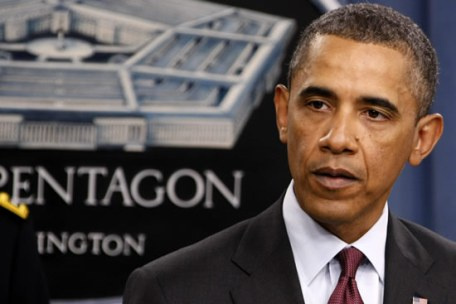Obama in the Pentagon: A Geopolitical analysis

By: Mohammad-Kazem Sajjadpour
On 5th of January, Obama walked into the Pentagon and spoke of America’s new defence program, in which he reported of the US’ international strategy and forthcoming cuts to the US military budget and personnel. Obama’s remarks and the comments of the US Defence Secretary, Leon Panetta, in announcing the new US military strategy were of interest to various international circles as it sparked numerous discussions and debates.
How can the new US defence strategy be analyzed, and how is the nature of the new program different from the past?
The Coordinates
Foremost is the overwhelming pressure from the US congress to reduce the US budget deficit and government spending has driven this strategy. Furthermore, the circumstances regarding America’s two wars in Iraq and Afghanistan and Obama’s campaign pledge to withdraw US military troops from Iraq and reduce US forces in Afghanistan are factors.
The other significant factor is the current US election atmosphere, which forces candidates to evaluate every decision and action from an electoral perspective while maintaining a balanced strategy in regards to different voters’ views. Currently, the US military topic is one of Obama’s biggest concerns as during the republican primaries, opposition candidates largely accuse him of not paying enough notice to the US military and its personnel.
Parallel to these developments, the changing international conditions and geopolitical instabilities should be taken into consideration. These sets of conditions have affected the new US military strategy, which in a way are an extension of previous US policies.
Content and the Nature of Programs
Neither Obama nor Panetta provided clear-cut strategies during the Pentagon announcement, yet the following features could be drawn from their statements.
1- Budget and cost issues. It was announced that during the next 10 years there would be $450 billion in cuts to US military spending. Further, US forces would be reduced to 490 thousand from 570 thousand.
2- Increased efficiency of the US military forces and emphasis on technologic advances, which would ensure that the military cuts would not damage the strength of the US military.
3- US geostrategic focus on Asia. This does not mean that so far the US has overlooked Asia, but the new defense and security program will explicitly focus on suppressing any threat from China. Furthermore, Iran would be identified as a threat to the US in the west Asia region. This signifies that the US military strategy in the following decade will greatly focus on east and west Asia, mostly the Chinese region.
The Bigger Picture
The new US geopolitical strategy has an old and familiar tone to it, which indicates that the US is seeking to maintain its global leadership. Therefore, to maintain its global position the US is slightly changing its military and geopolitical strategy.
The new US defence strategy is a type of old geopolitical recipe manual. During the post-Cold War era and the introduction of globalization, some believed that geopolitics has lost its importance. Yet the initial optimism faded away as geographical boundaries broke, which reduced geographic importance in international disputes. The new US military strategy is an indicator of the return of geopolitics to strategic planning, as Asia is now becoming the center of the US military’s focus. This differs from previous geopolitical views where the Persian Gulf and Europe were considered the key geopolitical points. It must be noted that the Persian Gulf remains of significant global geopolitical importance.
Lastly, without understanding America’s geopolitical and military framework, its international strategies could not make clear sense. Yet more time is needed to clarify the remarks on the future of the US military strategy.

